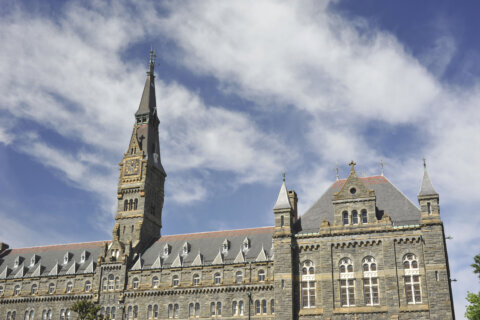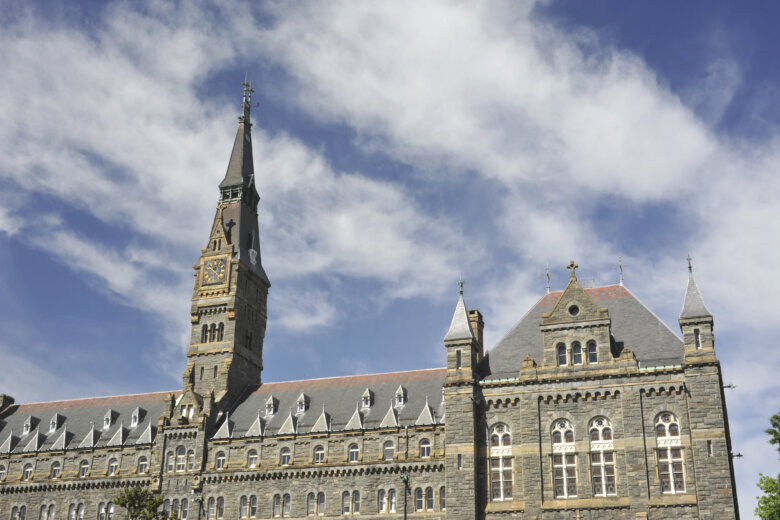
Georgetown Law’s incoming administrator Ilya Shapiro has come under fire for a now-deleted string of tweets on race and President Joe Biden’s Supreme Court nominees. However, it isn’t the first time Shapiro’s comments on race have entered the spotlight.
Shapiro, who the university announced would be executive director and senior lecturer at the Georgetown Center for the Constitution, tweeted a comment on Biden’s Supreme Court decision.
The tweet suggested that Sri Srinivasan should be included on the president’s list of nominees.
Biden has said he intends to nominate a Black woman to the nation’s highest court.
Shapiro now-deleted statement, however, leaned both into Srinivasan’s qualifications, and controversial statements on race.
“Objectively [the] best pick for Biden is Sri Srinivasan, who is [a solid progressive and very] smart,” he said in the tweet.
Shapiro added that Srinivasan “even has identity politics benefit of being first Asian (Indian) American.”
“But alas,” he wrote, “doesn’t fit into latest intersectionality hierarchy so we’ll get lesser black woman.”
The tweet drew scathing rebukes from members of the Georgetown community, including colleague and law professor Aderson Francois. He responded directly to the erased tweet as comments and questions continued to flow in for Georgetown Law.
I wrote the tweet on the left yesterday. The one on the right was posted a few hours later and we don’t even have a nomination yet. Good times. pic.twitter.com/TvWrs8ZXeb
— aderson francois 🇭🇹 14th Amendment Baby (@abfrancois) January 27, 2022
“I am curious: is your phrase ‘lesser Black woman’ meant to describe a particular Black woman or do you intend ‘lesser Black woman’ to encompass the general set of Black women under consideration for the seat,” Francois asked.
Shapiro apologized, calling the tweet “inartful,” though criticism and praise continued to populate the Twitter thread, with students and activists tagging the school’s public social media accounts.
In an email to graduate students at Georgetown Law, William M. Treanor, dean and executive vice president of the Georgetown University Law Center, called this appalling, The Washington Post reported.
“The tweets’ suggestion that the best Supreme Court nominee could not be a Black woman and their use of demeaning language are appalling,” Treanor said.
One tweet included notes that Black women nominated for a seat on the Supreme Court would “always have an asterisk” attached to their name, adding that it was “fitting that the Court takes up affirmative action next term.”
Another asked people to take a poll and answer if President Joe Biden was racist and sexist for committing to adding a Black woman to the Supreme Court. The poll garnered hundreds of votes before being removed.
Shapiro’s controversial moments
Scrutiny surrounding race was not an uncommon reality for Ilya Shapiro as he navigated his time as a political analyst, academic and researcher at places like the Cato Institute, where he served as vice president and director of the Robert A. Levy Center for Constitutional Studies.
Before announcements of his addition to Georgetown’s ranks, he came under fire for his opposition to the Akaka Bill, created primarily as a method to recognize Native Hawaiians similarly to Native American Tribes in the United States. He argued that the bill was unconstitutionally race-based, subverting the constitution.
“The Akaka Bill, which I’ve covered extensively, would create a race-based governing entity that would negotiate with the federal and state governments over all sorts of issues — effectively carving out an unconstitutional system of racial spoils,” he wrote while at the Cato Institute
Shapiro has also been a stalwart supporter of the University of North Carolina’s challenge to affirmative action, saying that racial preferences overdetermine the qualifications of those allowed in prestigious university chairs.
“In many circumstances, UNC’s admissions officers explicitly focus on racial classifications, treating an applicant’s race as a top-line qualification alongside GPA and SAT scores,” Shapiro wrote alongside Gregory Mill for the Cato Institute.
Shapiro also called the country’s first Attorney General Eric Holder, in a now-deleted column for the Cato institute “a modern-day George Wallace,” hearkening back to the segregationist Alabama governor. A now-deleted tweet commenting on claims that Holder “has called for racial preference now, racial preferences tomorrow, racial preferences forever” called the comparison a “minor hyperbole.”
Georgetown’s year navigating race
This isn’t the first time that Georgetown Law as had to contend with issues of race and racist commentary on its campus recently.
Last year, a Georgetown Law professor was rebuked by Dean Bill Treanor, who, again, said he was “appalled” by the conversation that former professors Sandra Sellers and David Baston had with their students.
Sellers, in the Zoom call noted angst surrounding students who were perceived as lower-performing.
“I hate to say this. I ended up having this, you know, angst every semester that a lot of my lower ones are Blacks,” Sellers said to Baston. “Happens almost every semester.”
“What drives me crazy is, you know, the concept of how that plays out. And whether that is, you know, my own perceptions playing in here and when certain, my own, you know, my own unconscious biases, you know, playing out in the scheme of things,” Batson responded.
Sellers was fired by the institution following publication and rebuked by several groups on the campus. Baston’s resignation was announced 48 hours later.
The campus also came under fire for its continued delay of funding for the GU272 — a name for more than 300 slaves sold by the Maryland Province for the Society of Jesus in 1838. Those slaves are part of Georgetown’s history and helped to grow the university.
In a conversation with The Hoya, the University’s president John J. DeGioia said that distribution of the $400,000 set aside by student referendum for descendants of the GU272 would begin this spring.
“We didn’t feel it was appropriate to get ahead of the foundation. With our work, we didn’t want to create confusion in the larger communities,” he said. “I regret that it took us longer than I would have hoped because we made the commitment to do all this in November of 2019.”
WTOP’s Zeke Hartner and Will Vitka contributed to this report.









